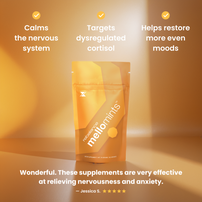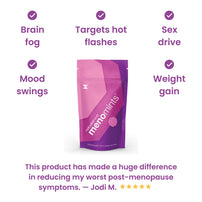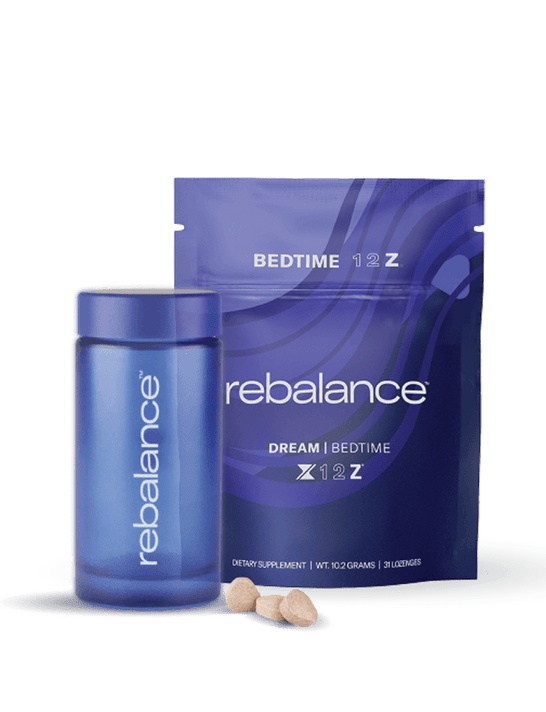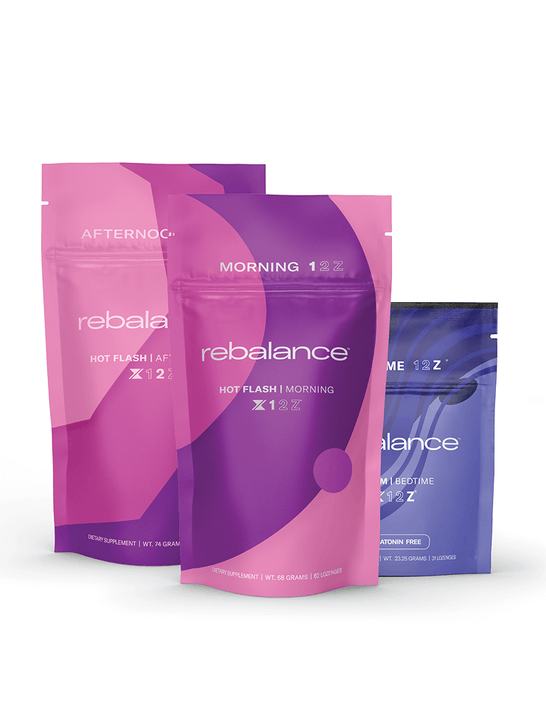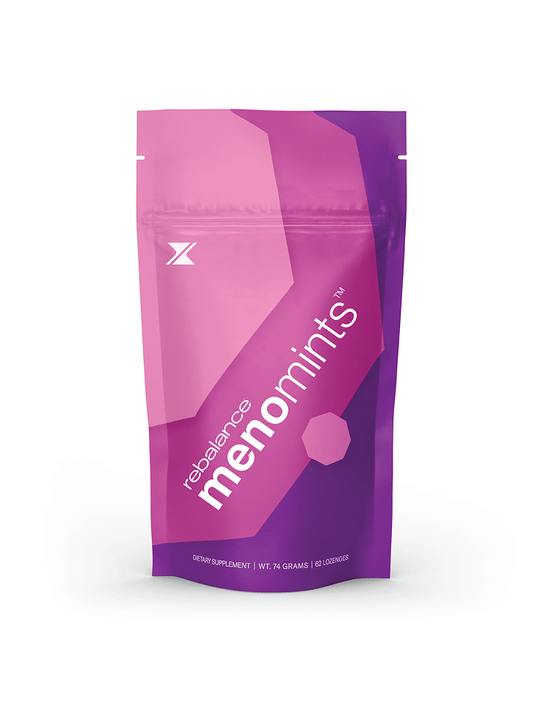10 Signs of Hormonal Imbalance in Women
07/19/2022 by Rebalance Health

INSIDE THIS ARTICLE
2. Symptoms of Hormonal Imbalance in Women
3. Natural Remedies for Hormone Imbalances for Women
You have over fifty hormones coursing through your body all the time. These hormones help regulate everything from your mood and metabolism to sex drive, sleep patterns, reproduction, and how you deal with stress.
In a perfect world, you would have the right amount of each hormone and they would work together like the best of friends. In reality, your hormones can be as complicated as a teen going through puberty. When your body makes too much or too little of any hormone, it can have a domino effect on others, causing a hormone imbalance that can lead to all kinds of issues.
What causes hormonal imbalance in women? What are the common symptoms of hormonal imbalance in women? And, what are some natural remedies to help support hormone balance for women?

What Causes Hormonal Imbalance in Women?
Women naturally encounter hormonal fluctuations during puberty, pregnancy, breastfeeding, and menopause. Chances are you’ve already experienced one of these milestones, and while these are important phases in a woman’s life, they can be a real doozy. If you’ve been menstruating for a while, you’re no stranger to the cramps, migraines, irritability, and pesky hormonal acne that comes packaged with the devil we call periods.
But your period is only one part of the equation. Your menstrual cycle is made up of four different phases: menstruation, follicular, ovulation, and luteal. Throughout your menstrual cycle, your reproductive hormones naturally ebb and flow each month as you move through the four phases.
For your menstrual cycle to work, there is a delicate balance that needs to be maintained with the right hormones rising and lowering at the right time. Aside from your menstrual cycle, your hormones also need to function properly to maintain your sex drive, metabolism, sleep, and even blood sugar levels. Any hormonal balances can, therefore, disrupt your menstrual cycle and cause all sorts of shenanigans in your body.
There are many causes of irregular hormonal imbalance in women. These causes can be divided into three general categories: medical conditions, lifestyle, and environment.
MEDICAL CONDITIONS
There are several health conditions and medications that can disrupt your hormone balance. These conditions include:
- Taking birth control pills
- Hormonal replacement therapy
- Polycystic ovarian syndrome (PCOS)
- Type 1 and 2 diabetes
- Benign and cancerous tumors
- Endocrine gland disorders, like Cushing’s or Addison’s disease
- Hyper- or hypothyroidism
- Eating disorders
- Illness or trauma
- Menopause
LIFESTYLE
Lifestyle also plays a big role in your hormone health and some lifestyle factors that can affect your hormone balance, include:
- Eating a traditional Western diet that’s high in sugar, refined carbohydrates, and unhealthy fats
- Sedentary lifestyle
- Being overweight or obese
- Poor sleep
- Abnormal circadian rhythm such as working night shift and sleeping during the day
- High levels of stress
ENVIRONMENT
There are several environmental factors that can contribute to or cause hormone imbalances. Here are some sources of hormone-disrupting chemicals, known as endocrine disruptors:
- Pollutants in air and water
- Pesticides and herbicides in food
- Toxins in cookware, cleaning products, and cosmetics
Symptoms of Hormonal Imbalance in Women
During your period or pregnancy, you’ll experience a range of symptoms and changes that will affect your body (yes, baby bump, we’re looking at you) and likely affect your mood. This is normal and temporary — however, even common symptoms, like PMS, can be intensified when other hormones are chronically out of sync. Think debilitating cramps that make you wish you were a man. Or severe mood swings that may make it hard to function. While mild symptoms are common, severe symptoms that impact your quality of life could be a sign that there is an underlying issue that needs to be addressed.
Aside from menstrual cycles, perimenopause, menopause, and post menopause bring their own set of hormonal imbalances. Unlike your period, though, hormonal fluctuations during the menopausal phases have little to do with external factors. They’re simply part of life.
How do you know if you’re struggling with a hormonal imbalance? You’ll have one or more symptoms. However, if you suspect your hormones are playing the fool, it’s best to consult with your primary doctor or even an endocrinologist to get checked out. Keep in mind that your symptoms are a sign that something is amiss. The root cause is your hormone imbalance, so uncover and address the cause directly.
Here are ten common symptoms you can experience when your hormones are not balanced.
FATIGUE
If you always feel tired or like you need a nap, even after a good night’s sleep, it may be your hormones. Progesterone works with melatonin to regulate sleep cycles, so if you have too much of it, you might feel tired all the time. The hormones your thyroid makes can also be the culprits.
MOOD SWINGS
If you feel like your emotions are swinging like a pendulum and they don’t match your environment, you may be experiencing mood swings. Mood swings can range from feeling crabby to nervous and can even lead to anxiety and depression. Mood swings are also a common symptom of the stages of menopause.
While everyone experiences some moodiness from time to time, excessive mood swings are a sign that something is wrong. Having mood swings is nothing to be ashamed of, but it is important to see a healthcare professional before it has a severe impact on the quality of your life and your relationships.
HOT FLASHES
Your body has a thermostat called the hypothalamus. When it feels like someone has cranked your thermostat up, it’s because your estrogen levels are down and your body is trying to do damage control and cool you down.
Your low estrogen levels seem to confuse your poor hypothalamus, who thinks that you’re standing on the edge of a volcano when you’re not. Your body then tries to regulate your temperature by increasing your blood flow, dilating the blood vessels in your skin, and increasing how much you sweat, all to cool you down. And voila, you’re now experiencing a hot flash.
Thankfully, hot flashes are mostly associated with menopause and blow over once you’re in post menopause. But until then, your hypothalamus will continue to trigger those hot flashes. Want to end your hot flashes? One option is to try Hormone Replacement Therapy (HRT). Not all women are good candidates for this type of therapy, and it comes with some hefty risks.
If you’re not a good candidate for HRT or if you’d prefer a more natural approach, our Hot Flash System is a hormone-free solution that can provide you relief night and day with three non-addictive lozenges. Did we mention it also helps with libido and sleep? Hot flash relief and improvement of your two favorite bedroom activities. What more could a woman ask for?
APPETITE & WEIGHT CHANGES
Haywire hormones can mess with your metabolism and your appetite, which can lead to eating more or less than usual. These changes to your metabolism and appetite can cause weight loss or weight gain. In fact, when you have an underactive or overactive thyroid which causes imbalanced thyroid hormones, you can gain or lose weight without changing your eating habits.
Gaining weight in your midsection or all-over puffiness can also be tied to hormone levels. This type of weight gain is typically seen in women who have PCOS because the condition causes women to have high testosterone levels, which can lead to women putting on weight around their midsection.
DIGESTION
The food you eat has a big impact on your digestive system and how your stomach feels. However, a hormonal imbalance can be involved if you’re regularly experiencing belly bloating, gas, diarrhea, or constipation.
LACKLUSTER LIBIDO
Hormonal imbalances in women can alter sex drive. You may notice you feel less in the mood than you used to or experience physical changes like vaginal dryness that make sex uncomfortable or even painful.
MENSTRUAL CHANGES
Changes to your period, outside of pregnancy and menopause, are clear signs something is up with your hormones. Changes can include heavier than usual bleeding, extra painful cramps, extreme PMS, missing a period (often from elevated cortisol), breakthrough bleeding, spotting, or an erratic and unpredictable cycle. If you’re experiencing changes to your menstrual cycle, see your OBGYN to rule out other concerns like polycystic ovary syndrome (PCOS) or early-onset menopause.
INFERTILITY
Hormonal imbalances in women can affect fertility and can make it more difficult to conceive. Signs of infertility may include fluctuations in your menstrual cycle, a lack of a period, or trying to conceive for at least six months with no success. Infertility can have many causes, so it is important to speak to a doctor to address the underlying cause.

INSOMNIA
Your hormones may be keeping you up at night. Too much cortisol and not enough melatonin or progesterone can cause insomnia. Night sweats or hot flashes while you’re trying to sleep can also impact the quality of your sleep. Combine hot flashes with the inability to fall asleep, and you may land a role in the next Zombie Apocalypse blockbuster.
SKIN & HAIR CHANGES
Unwanted hair growth, called hirsutism, is a telltale sign of hormonal imbalance in women. It typically shows up along the jawline, chin, neck, and/or chest. Keep in mind, women aren’t supposed to be smoother than dolphins, so if you have some facial hair, especially if it is common for your ethnicity, then there is no reason to panic. If you are suddenly growing unwanted hair across your face or neck, then it’s worth consulting with your doctor to rule out any hormonal issues.
Skin changes are also common when you are experiencing a hormonal imbalance. Your skin can become dry and flaky, and your hair can become brittle and break easily. It’s normal to lose a few strands of hair each time you brush or wash it, but excessive shedding or thinning hair is not. A blemish here or there around your period is also normal, but chronic breakouts are not.
If you notice your skin has become more oily and your hair has started falling out or breaking more than usual, then it may be because of PCOS. Be sure to chat with your doctor about your concerns to get a proper diagnosis if you are concerned about any skin or hair changes.
Natural Remedies for Hormone Imbalances for Women
Many of the symptoms of hormonal imbalance in women may seem like minor inconveniences, or mere realities women just have to live with. This is dangerous thinking.
Hormonal imbalances don’t go away. They’re likely to get worse, affect other hormones, and can trigger serious health concerns if you do nothing to shift your body back to its happy place.
Lifestyle changes are the best natural remedies you have against hormonal imbalances. If you are struggling with multiple symptoms of hormone imbalance, or you’ve tried making lifestyle changes and experienced no improvement, consult with your doctor, though.
Here are five natural remedies to support healthy hormone levels that may help you rebalance your hormones and get your health and quality of life back on track.
EXERCISE
Exercise is a solid go-to. Besides helping you work out excess energy, get an instant mood boost, and relax, moving your body also helps bring down high cortisol levels and improves your blood sugar.
A regular fitness routine can also help you lose weight and build muscle. Maintaining a healthy weight is an important part of the equation for happy hormones. Try to get 30 minutes of physical activity at least three times a week to improve your health and hormone health. Ideally, you want to include some weight lifting but any exercise will do if lifting isn’t your idea of fun.
HEALTHY FOOD CHOICES
Your food choices can influence hormone health, so cleaning up your diet is a natural way to improve your hormone health. Excess sugar and unhealthy fats are linked to weight gain and high estrogen levels for women, so reducing these foods as much as possible should be your first goal.
Besides cutting down on sugar and unhealthy fats, the best way to prevent hormone health issues is to ensure that you are eating a balanced diet full of whole foods.
An easy way to improve your diet is to include plenty of lean proteins, healthy fats, and fruit or vegetables at each meal. Some lean proteins to try include:
- Boneless, skinless chicken breast
- White meat turkey
- Eggs
- Seafood
If you don’t eat meat, then tofu, beans, and lentils are healthy plant-based protein sources.
Healthy cooking oils include avocado oil, coconut oil, and ghee. You can also get healthy fats from nuts, seeds, olives, and avocados.
Try to limit your intake of processed meats, refined carbohydrates (i.e., white bread and pasta), sweets, and packaged foods.
STRESS MANAGEMENT
Chronic stress can send cortisol levels soaring. And the only thing we want soaring is our bank balance and our confidence. Cortisol levels are important because when your cortisol levels are constantly elevated, it impacts other hormones and influences everything from appetite to aging and sleep patterns.
Stress management looks different for everyone. Diaphragmatic breathing, spending time in nature, journaling, reading, or simply building more downtime into your schedule can all help you decompress. If you’re struggling with managing your stress, working with a therapist to help you optimize your life and find stress management techniques tailored to your personality is a fantastic option. If you can’t afford therapy, there are many helplines and online communities where you can get counseling for free.
REST
Rejuvenating sleep gives your body a chance to stabilize, reset, and return to equilibrium.
If your current slumber time is falling short, try going to bed earlier, doing something relaxing before bed, and ending screen time at least 1 hour before bedtime. Phones, tablets, computers, and televisions give off blue light, which stimulates your brain and interferes with the production of melatonin, the sleep hormone. So get into the habit of switching your devices off before bed or at least setting up blue light filters to prevent your devices from messing with your sleep.
SUPPORT WITH SUPERCEUTICALS™
Products that contain adaptogens—with plant-based compounds—can help your body better handle stress and counteract signs of hormonal imbalance in women. Adaptogens can give you a subtle energy boost or help you wind down.
The Hot Flash System offers natural hormone balance for women. It contains the adaptogens maca and ashwagandha, Panax ginseng, and astragalus root to help support optimal hormone levels. It is scientifically proven to reduce, if not end, hot flashes. The women’s formulation has ingredients specifically curated for women, including Bacopa and Oat Straw. It’s designed to naturally improve your circadian rhythm and cortisol levels so your body can have healthy levels of all hormones.
If you’ve enjoyed this article, take a listen to this conversation between Gabby Reece and our Chief Medical Officer about why hormonal health is important, signs of your imbalance & natural tools to manage your health span.
Overview

Stay Calm. Sleep Deep. Wake Clear.
A lozenge that supports deep sleep, better REM, and calmer nights. Without melatonin — unless you want it.



